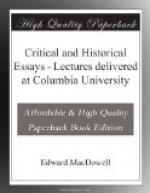Bach never troubled himself about an art from which he was so widely separated both by training and inclination. Thus the reformation of opera (I mean the old opera of which I have been speaking) devolved upon Gluck. His early operas were entirely on the lines of those of Hasse and Porpora. He wrote operas for archduchesses ("Il Parnasso” was played by four archduchesses and accompanied on harpsichord by the Archduke Leopold), and was music master to Marie Antoinette at Vienna. It was owing to these powerful influences that his art principles had an opportunity to be so widely exploited. For these principles were not new; they formed the basis of Peri’s first attempt at opera in 1600, and had been recalled in vain by Marcello in 1720. They were so simple that it seems almost childish to quote them. They demanded merely that the music should always assist, but never interfere with either the declamation or dramatic action of the story. Thus by Gluck’s powerful influence with what may be termed the fashion of his day, he did much to relegate to a place of minor importance the singer, who until then had held undisputed sway. This being the case, the great art of singing, which had allowed the artist the full control and responsibility of opera, thus centering all upon the one individuality, degenerated into the more subordinate role of following the composer’s directions.
It now became the duty of the composer to foresee every contingency of his work, and it lay with him to give directions for every detail of it. As a result, the singers, having no longer absolute control but still anxious to display their technical acquirements, gradually changed into that now almost obsolete abomination, the “Italian opera singer,” an artist, who, shirking all responsibility for the music and dramatic action, neglected the composer so far as possible, and introduced vocal pyrotechnics wherever he or she dared—and their daring was great.
In the meantime, as Gluck was bringing in his reforms, songs were gradually introduced into the Schauspiel or drama, the ill-fated brother of opera in Germany; and just as the grand opera reached its highest point with Gluck, so this species of melodrama grew apace, until we see its culmination in Weber’s “Freischuetz.”
The good results of Gluck’s innovations and also, to a certain degree, its discrepancies, may be plainly seen in Mozart’s operas; for only too often in his operas Mozart was obliged to introduce fioriture of the poorest possible description in situations where they were utterly out of place. This, however, may not be entirely laid at the door of the exacting singer, for we find these same fioriture throughout his harpsichord music.
We may almost say that the union of drama and music was first definitely given status by Mozart; for a number of his operas, such as the “Schauspieldirektor,” etc., were merely a form of the German Singspiel, which, as I have said, culminated in “Freischuetz.”




